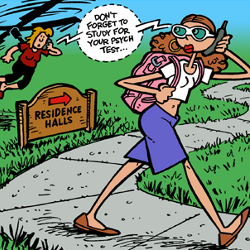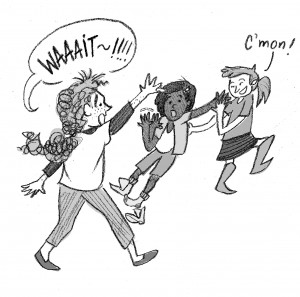|
|
April 27, 2013
UPDATE (See end of blog for exciting news about my new book.)
Last month I started working on a new girls’ friendship book with awesome illustrator Erica De Chavez.
If you have a daughter, you don’t need me to tell you that girl friendships can be super complicated and fraught with challenges for girls and their moms! When things get sticky, kindness and respect often go missing in action and feelings get hurt all around.
Since 1997, girls from all over the planet have been turning to me for help in navigating their friendship messes. I guess that makes me an expert on social garbage. The girls who email me are tweens and teens. But I thought, if I write a book to help younger girls, maybe they will have easier friendships when they get to middle school. We can always hope, right? But hope is no strategy for making things better. What our girls need are effective tools for managing conflicts. Combine those tools with the self-respect and social courage to use them… now we’re talking about effective strategies for positive change.
Here’s a sneak peek at the book:
Q: Every time me and my friend have a private conversation, this new girl pulls her away. What do I do??
A: I don’t blame you for not wanting your private conversations interrupted. That’s so annoying! It sounds like the new girl has lots of power, but she doesn’t have all the power. If your friend didn’t want to get pulled away she could tell the girl to stop. She hasn’t done that yet. And you haven’t yet told your friend how you’ve been feeling.
Real friends tell each other the truth. Talk to her. You might say something like this: “I don’t like it when ____ pulls you away from me. How come you let her do that?” Then close your mouth and listen to what your friend has to say.
The next time the new girl tries to yank her away, your friend will either stand up for herself or she’ll let herself be yanked. That’s her choice. One more thing you might think about: Why is the new girl snatching your friend? It’s not always easy being the “new girl” who doesn’t have friends yet. I think that would feel LONELY! She probably just wants a friend and doesn’t know a more polite way to make one. Maybe you and your friend could team up with her and be friends together. That could work!
Anyway, the snatching stuff needs to stop. So talk to your friend. If things don’t change, what are you going do? You can either stand there watching the two of them go off together or you can reach out to other girls and make some new friends. You see, you have choices too!
______________
Sneak peek #2 and sneak peek #3 of the Girls’ Friendship Q&A Book.
UPDATE: July 22, 2014 After a year in production, The Girls Q&A Book on Friendship will be published by Electric Eggplant in September. Just in time for the new school year and the inevitable friendship drama heading toward your 8–12 year old daughter. Every girl needs friendship support from time to time. My book provides that plus:real world advice for navigating through the “social garbage,” friendship quizzes, and advice from older girls about how to be a Super Friend. If you’d like to preorder The Girls Q&A Book on Friendship for a girl in your life, or you’d just like a personal heads-up when the book is available, email me (Connect@AnnieFox.com).
UPDATE: October 3, 2014 It’s here! The Girls Q&A Book on Friendship: 50 Ways to Fix a Friendship Without the DRAMA is now available in print and on Kindle (the ebook can be read on any device, your mobile phone, tablet, or computer with the free Kindle reader app). Visit GirlsQandA.com for an excerpt, reviews, and to order your copy.

April 15, 2013
This morning’s email brought some of the usual questions from TeenWorld:
- How do I stop being shy so I can make more friends?
- Should I tell me bff that I kissed her bf?
- My friend can be kinda mean, but my life wouldn’t be the same with out her. What should I do?
- My parents accuse me of smoking and doing drugs. I don’t! How can I get them to trust me?
 Be careful what you wish for And then there was this one. Even though I’ve heard it before, somehow it felt new. I responded right away, but if that’s all I did only one girl would see it. For something this important I decided to go bigger.
Girls, have a read. So when it comes to self-respect, relationships and sex, we can get clear on a few basics. If you’re a mom with a girl of your own, you should read it too. (Just don’t go nuts and accuse your daughter of anything! Not helpful for keeping open the portals of trust and communication.) And if you’re a teen guy or a dad, probably a good idea for you to read it too. Then you can think (and maybe even talk) about respect and relationships and the god’s honest truth that girls and guys don’t typically share a common perspective on sex and what it means.
Hey Terra,
A lot of my friends have lost their virginity and I really want to lose it and get it over and done with. This guy that I’ve known for ages but haven’t seen for a while wants me to come over tomorrow have sex with him. I want to, but I don’t know what the consequences are. A lot of people said you get attached and some don’t. I don’t know what to do. Can you please help me!!!
Wanna Lose it Already
Dear Wanna Lose It,
I don’t know if your friends are in loving, mutually respectful relationships (I sure hope so) but if what they’re doing is right for them, that doesn’t automatically make it right for you. You wrote to me for a second opinion. That indicates you’re wondering if having sex is the right move for you at this time.
You asked about the “consequences.” I don’t know how old you are or why you’re in such a hurry to not be a virgin any more. But I do know that sex isn’t something you do because you want it to be “over and done with.” That makes sense if you’re talking about taking out the trash or working on a dreaded homework assignment. But when it comes to sex, getting it “over and done with” is wrong thinking that will lead to a lot of disappointment and heartache.
Sex ought to be an act of love. If there isn’t mutual respect and trust, it’s just not good. Especially for girls. If your friends think of sex as something very casual that you do with just anybody, then it’s likely they will go from one sex partner to another, feeling crappy about themselves, empty and unloved.
Please do not follow in their footsteps.
As for the guy that you’ve know “for ages” who wants to have sex with you tomorrow. Don’t take that as a great offer or as a compliment. He wants to use your body so that he can have an orgasm. Afterwards, he will send you away and tell everyone what you let him do. Then his friends will text, saying they want to have sex with you too. Other girls will start talking about you. And if you do get “attached” to the first guy, he’ll make it very clear that he wants sex, not a relationship. All of this is going to make you feel horrible. And, on top of that, you might get pregnant. (Another very real consequence.) You might also get a sexually transmitted disease.
But what you most certainly will NOT get, is a feeling of being loved and treasured. You deserve that. If you settle for less you’ll regret it.
I hope this helps you sort out your feelings so that you can make your own decisions. One that’s 100% right for you.
In friendship,
Terra

April 9, 2013
I originally wrote a version of this article for TakePart.com where I contributed a weekly education post from Sept. 2012-Feb. 2013. Check out the rest of my articles there.
 If you're not planning on going to college with them, land that thing now! The late (truly) great Shel Silverstein made a truly brilliant point in his poem, Helping.
Some kind of help is the kind of help that helping’s all about
And some kind of help is the kind of help we all can do without!
He wasn’t talking about parents, but he could have been. Helping children is encoded in every parent’s DNA, so how could it be a bad thing?
As Shel pointed out, some help is not at all helpful, especially when the goal is to help kids become independent, fully functioning, young adults. (That is the goal, right?)
Imagine you’re the head teacher in your child’s Life Preparedness Training Course. Not far from the truth. So your long-term educational objective is to teach essential life skills, whatever you consider those to be. You’ve got 18 years to complete the curriculum before your child “graduates.” In terms of life-readiness, with which skills and character traits do you want your child to be equipped? Most parent include: independence, self-reliance, life-long learner, resilience, empathy, self-confidence, etc.
The long-term objectives may be clear, but the method…not always. In fact, sometimes our parental approach directly undermines our objectives. For example, suppose you prioritize “self-reliance,” but your 13 year old can’t for the life of him/her a) get ready for school in a timely fashion, and/or b) manage school challenges and after school obligations. Suppose also, that you have gotten into the habit of doing for your child what you say you want your child to learn to do for himself. Are you teaching your child self-reliance? Or something else?
Now before you head over to the comments section to remind me that not all children are capable of managing their time and responsibilities, let me agree with you. Not all children are 100 percent capable of balancing it all…yet. And some may never get close to managing their lives on their own. But all kids can learn to become more independent. When we require next to nothing of our kids until the time when they can do everything on their own, we are teaching them to be helpless.
Even a toddler can and should help put away her own books and toys. That’s not a “punishment” nor is it “mean.” Giving them responsibilities is a gift to them, part of our parenting legacy so that they can learn to do for themselves. Self-reliance is the objective. But when parents over-function (do much more than they ought to in relation to the child’s age and ability), then kids tend to under-function (do much less than they are capable of).
And what happens when those kids are at school and teachers expect them to take an active role in their own education? Sadly, it can create problems in individual classrooms and in the overall school climate. Teachers and administrators report that highly capable students (from highly educated parents) frequently lack motivation or initiative. Conversations with educators also indicate that kids whose parents tend to hover have more difficulty working and learning independently. (“They seem to need an awful lot of reassurance that they’re doing it ‘right.’ And even when you give it to them, they seem to be operating with a level of stress that makes it difficult for them to learn and apply what they’ve learned.”)
If you’d like to help your child on the journey toward independence (in school and in life), these tips offer a starting place:
1. Examine your assumptions about your parenting role in terms of helping vs. encouraging independence. If, for example, you believe that “A good parent always does everything for a child,” then you may be over-functioning to the detriment of your child’s development. Take some time to think about ways you can still be a good (even a great) parent without always doing everything for your child.
2. Talk to your child about your pride in his/her increasing maturity. Ask, “In what areas do you feel ready for more independence?” Listen with respect to what your child has to say. Tie together the concepts of added responsibility, added independence, and earned privileges.
3. Incorporate accountability into any discussion on independence and self-reliance. Hold your child accountable for keeping his agreements to family members, teachers, etc. Hold yourself accountable for keeping your agreements. (If that means you agree to not to interfere with homework, then take some deep breaths and stick to it.)
Our parenting journey is basically about teaching our kids to take care of themselves and providing them with age-appropriate opportunities to learn how to rely on their own judgment. If we parent well, eventually they won’t need us. But they’ll always need and use what’ve we taught them.

April 1, 2013
by Rick Ackerly, M. Ed.
Rick Ackerly is a nationally recognized educator and speaker with 45 years experience. He’s served as head of four independent schools, speaks to parent and school groups across the country and at education conferences. Rick is the author of The Genius in Every Child. Visit his blog to learn more about his innovative approach to education and parenting.
 Rick Ackerly knows about the genius in children
Last month, waiting at gate B22A at O’Hare a parent told me how frustrated she was with her teenage daughter.
“I’ve tried everything with Julie. I read the parenting books and tried it all, and it’s just not working.”
“What did you try?” I asked.
“You know. I confronted unacceptable behavior; I acknowledged her feelings while insisting on what I wanted. I tried not take it personally, but nothing worked.”
“How do you know it’s not working?” I asked.
She looked at me as if I were either goading her or simply an idiot. “She keeps doing the very things I tell her not to do.”
“With teenagers,” I said. “That is not a sign that it is not working. Adolescents are not constituted to obey. They are wired to disobey. Well, not exactly disobey. They are wired to make their own decisions—not necessarily good ones, but to make them. It is essential for their survival that they practice making decisions and noticing results.”
She, of course, was not relieved to hear this. Raising teenagers can be a nerve- wracking experience, and I have never known a parent who is in the throes of this enterprise to be easily pacified. And anyway, I never got the chance to attempt further consolation, because the boarding process began just as I was delivering my shocking message that “They are wired to disobey.”
I wish I had had the time to tell her about a conversation I had with 18-year-old Allison as I drove her home from a basketball game one Wednesday evening several years ago.
“I listen to my father,” said Allison, “because I have found that he tells me things that turn out to be true. Like ‘Never go out without money,’ he says.”
Allison had needed someone to talk to. Last Saturday night there had been a party where some of her classmates got drunk and trashed the house of a classmate.
She went on: “I wish I could talk to the parents of my friends and tell them how to talk to their kids. I wish they would tell them things like ‘Never go out without money.’ There we are at Starbucks and they’re all, ‘Allison, can you pay for this? I didn’t bring any money,’ and I go, ‘Sure.’ But it get’s annoying. They do pay me back, but it’s annoying. Parents ought to be careful what they tell their kids, so that when they give them advice, the kids will listen. What those kids did to that house was gross.”
“But you don’t always do what your father says, do you?”
“No, but when he talks, I do listen. Sure, it makes me mad when he tells me to get off Facebook and to start doing my homework, but I know he is telling me the right thing. That’s the point. I know it is the right thing for him to tell me. It makes him mad when I don’t do it right away, but that’s the way it’s supposed to be between parents and their teenagers. I know he’s right. I just have to do it myself. He has become like an authority. When he speaks I listen.”
Don’t all parents want to become “like an authority?” Listen to Allison. She is on to something very important.
Until age five, it is important for parents to back up their statements—with force if necessary. If a parent says: “No, you can’t have a candy cane before dinner,” then it is very important that the child does not eat a candy cane before dinner. “Eight o’clock bedtime” has to mean: In bed by eight. Period. If a parent says it’s bad for you and then let’s you do it, how can you trust such a parent? Why should a child listen to such a parent?
However, by age thirteen, the human brain is working to develop and consolidate the part of the brain that makes decisions—the pre-frontal cortex. By 18 the teenage brain has all the circuitry of an adult brain, but not enough practice. They know drinking to excess is not good for you, and that trashing a house is very bad, but the adolescent mind is open to other possibilities which must be tested to be “known.” Close relationships with adult authorities are important for helping kids know which end is up. If kids listen to parents it is because parents have proven that they are authorities worth listening to.

| |















